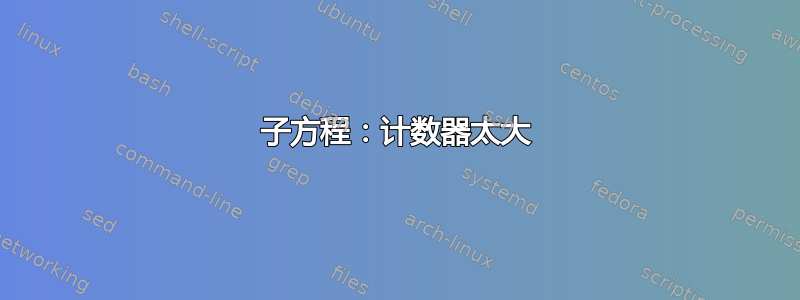
我有几个父方程,每个方程都有超过 30 个子方程。当我使用子方程命令正常写入时,我收到“计数器太大”错误。
我发现有一个名为“alphalph”的包可以解决这些不同风格的编号问题。我见过此解决方案在 StackExchange 中查找子方程,但它对我不起作用!我仍然收到错误!!(因为我稍后要引用它们,所以我也需要给它们贴上标签)。
有人知道问题出在哪里吗,或者建议替代方案吗?
谢谢
答案1
或许,试试这个吧!
\documentclass{article}
\usepackage{amsmath}
\usepackage{alphalph}
\usepackage{etoolbox}
\newcommand{\alphalphval}[1]{\alphalph{\value{#1}}}
\AtBeginDocument{%
\AtBeginEnvironment{subequations}{%
\let\alph\alphalphval%
}
}
\begin{document}
\begin{subequations}
\begin{align}
f(x) &= ax^2 + bx + c \\
f(x) &= ax^2 + bx + c \\
f(x) &= ax^2 + bx + c \\
f(x) &= ax^2 + bx + c \\
f(x) &= ax^2 + bx + c \\
f(x) &= ax^2 + bx + c \\
f(x) &= ax^2 + bx + c \\
f(x) &= ax^2 + bx + c \\
f(x) &= ax^2 + bx + c \\
f(x) &= ax^2 + bx + c \\
f(x) &= ax^2 + bx + c \\
f(x) &= ax^2 + bx + c \\
f(x) &= ax^2 + bx + c \\
f(x) &= ax^2 + bx + c \\
f(x) &= ax^2 + bx + c \\
f(x) &= ax^2 + bx + c \\
f(x) &= ax^2 + bx + c \\
f(x) &= ax^2 + bx + c \\
f(x) &= ax^2 + bx + c \\
f(x) &= ax^2 + bx + c \\
f(x) &= ax^2 + bx + c \\
f(x) &= ax^2 + bx + c \\
f(x) &= ax^2 + bx + c \\
f(x) &= ax^2 + bx + c \\
f(x) &= ax^2 + bx + c \\
f(x) &= ax^2 + bx + c \\
f(x) &= ax^2 + bx + c \\
f(x) &= ax^2 + bx + c \\
f(x) &= ax^2 + bx + c \\
f(x) &= ax^2 + bx + c \\
f(x) &= ax^2 + bx + c \\
f(x) &= ax^2 + bx + c
\end{align}
\end{subequations}
\end{document}
使用不同的样式进行更新:
为了获得该aa,bb,cc风格,需要用 来\newalphalph定义一种新风格,比如,\aalphalph(参见代码以了解精确定义and let\alph use\aalphalph`。)
\documentclass{article}
\usepackage{amsmath}
\usepackage{alphalph}
\usepackage{etoolbox}
\makeatletter
\newalphalph{\aalphalph}[mult]{\alphalph@alph}{26}
\newcommand{\alphalphval}[1]{%
\@ifundefined{c@#1}{% check first if #1 is a counter (\c@#1)
\aalphalph{#1}% No, it's most likely the direct value
}{%
\aalphalph{\value{#1}}% It's a counter, so use \value{#1}
}
}
\makeatother
\AtBeginEnvironment{subequations}{%
\let\alph\alphalphval%
}
\begin{document}
\begin{subequations}
\begin{align}
f(x) &= ax^2 + bx + c \\
f(x) &= ax^2 + bx + c \\
f(x) &= ax^2 + bx + c \\
f(x) &= ax^2 + bx + c \\
f(x) &= ax^2 + bx + c \\
f(x) &= ax^2 + bx + c \\
f(x) &= ax^2 + bx + c \\
f(x) &= ax^2 + bx + c \\
f(x) &= ax^2 + bx + c \\
f(x) &= ax^2 + bx + c \\
f(x) &= ax^2 + bx + c \\
f(x) &= ax^2 + bx + c \\
f(x) &= ax^2 + bx + c \\
f(x) &= ax^2 + bx + c \\
f(x) &= ax^2 + bx + c \\
f(x) &= ax^2 + bx + c \\
f(x) &= ax^2 + bx + c \\
f(x) &= ax^2 + bx + c \\
f(x) &= ax^2 + bx + c \\
f(x) &= ax^2 + bx + c \\
f(x) &= ax^2 + bx + c \\
f(x) &= ax^2 + bx + c \\
f(x) &= ax^2 + bx + c \\
f(x) &= ax^2 + bx + c \\
f(x) &= ax^2 + bx + c \\
f(x) &= ax^2 + bx + c \\
f(x) &= ax^2 + bx + c \\
f(x) &= ax^2 + bx + c \\
f(x) &= ax^2 + bx + c \\
f(x) &= ax^2 + bx + c \\
f(x) &= ax^2 + bx + c \\
f(x) &= ax^2 + bx + c
\end{align}
\end{subequations}
\end{document}
答案2
subequations用于\alphalph代替的补丁\alph;可以使用类似的补丁以不同的方式对子方程进行编号。
图片只显示最后几排。
\documentclass{article}
\usepackage{amsmath}
\usepackage{alphalph}
\usepackage{etoolbox}
\patchcmd{\subequations}{\alph{equation}}{\alphalph{\value{equation}}}{}{}
\begin{document}
\begin{subequations}
\begin{align}
f(x) &= ax^2 + bx + c \\
f(x) &= ax^2 + bx + c \\
f(x) &= ax^2 + bx + c \\
f(x) &= ax^2 + bx + c \\
f(x) &= ax^2 + bx + c \\
f(x) &= ax^2 + bx + c \\
f(x) &= ax^2 + bx + c \\
f(x) &= ax^2 + bx + c \\
f(x) &= ax^2 + bx + c \\
f(x) &= ax^2 + bx + c \\
f(x) &= ax^2 + bx + c \\
f(x) &= ax^2 + bx + c \\
f(x) &= ax^2 + bx + c \\
f(x) &= ax^2 + bx + c \\
f(x) &= ax^2 + bx + c \\
f(x) &= ax^2 + bx + c \\
f(x) &= ax^2 + bx + c \\
f(x) &= ax^2 + bx + c \\
f(x) &= ax^2 + bx + c \\
f(x) &= ax^2 + bx + c \\
f(x) &= ax^2 + bx + c \\
f(x) &= ax^2 + bx + c \\
f(x) &= ax^2 + bx + c \\
f(x) &= ax^2 + bx + c \\
f(x) &= ax^2 + bx + c \\
f(x) &= ax^2 + bx + c \\
f(x) &= ax^2 + bx + c \\
f(x) &= ax^2 + bx + c \\
f(x) &= ax^2 + bx + c \\
f(x) &= ax^2 + bx + c \\
f(x) &= ax^2 + bx + c \\
f(x) &= ax^2 + bx + c
\end{align}
\end{subequations}
\end{document}
你可以得到编号为“1-01”的子方程,等等
\makeatletter
\patchcmd{\subequations}
{\alph{equation}}
{-\two@digits{\arabic{equation}}}
{}{}
\makeatother
而不是\patchcmd上面的行。在这种情况下,alphalph无需加载。(我假设您没有超过 99 个子方程。)





